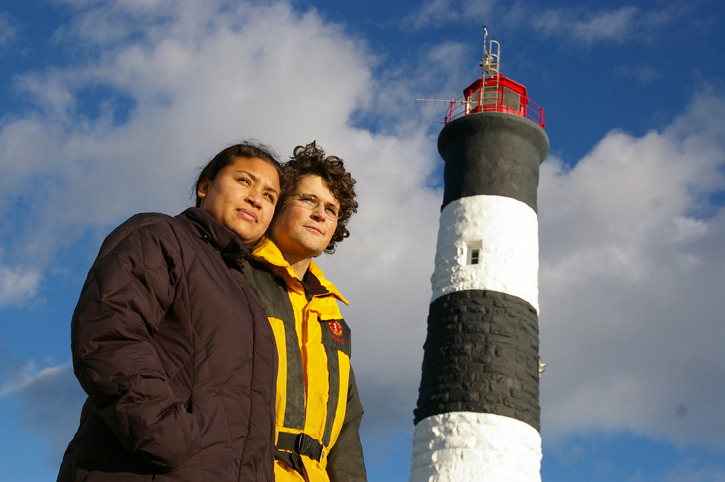The 150th birthday of Race Rocks lighthouse slipped past on Dec. 26 with little fanfare.
The 25 metre, granite structure located on a lonely archipelago 16 kilometres off the southern shore of Vancouver Island is rarely seen close up. You can point at it from the shore of Metchosin or pass it on whale watching boats, but only a lucky few will ever actually visit it.
“We could make a lot of money bringing eco-tours here or hosting nature photography classes, but that might ruin the island,” said Ryan Murphy, 28, who has lived year-round on the island as its “eco-gardian” since 2008.
That’s not to say nobody should visit the island, but those who do should come for research or to help with its stewardship, Murphy said.
In September he was joined on the island by Raisa Mirza, 23, one of his fellow alumni from Lester B. Pearson College, the international school in Metchosin that supports the eco-gardian program.
They share a cozy bungalow where the sound of marine radio provides the background noise for their days of environmental monitoring. They keep an eye on the waters, reporting illegal fishing boats and taking daily weather readings. Elephant seals and sea lions are a common site from their windows and in the fall every centmetre of the island is covered in birds.
Murphy is the island handyman while Mirza has taken on an outreach role, trying to make people more aware of the island and initiate fundraising campaigns to help protect it.
Unlike Fisgard Lighthouse in Colwood, which lit its lantern for the first time Nov. 16, 1860, Race Rocks isn’t considered a historic site. Her help was urgently needed after the department of fisheries listed Race Rocks lighthouse for sale in June, along with 975 other lighthouses deemed “surplus.”
“We want to make it clear that this lighthouse and the island is important and needs to be protected,” Mirza said.
To do this, she plans to spend the year introducing the island to each of the nearly 200 Pearson College students through a series of weekend programs.
“Historically only students on diving trips or those with an interest in marine sciences had the chance to come out,” she said. “We’re developing new programs to include everyone.”
Meanwhile, Garry Fletcher, who spearheaded efforts to have Race Rocks designated as an ecological reserve in the 1980s, said he doesn’t think there’s any real risk of the lighthouse being sold.
“Who’s going to buy it?” he said. “It’s so isolated, and the college is already taking care of it. I think it was included on the list by mistake.”
He also points out that the land the lighthouse is on belongs to the province, and only the lighthouse structure is federally (operated) owned.
When a senate committee visited Victoria for input on whether lighthouses on Vancouver Island should continue to be manned, Fletcher and the two residents of Race Rocks all attended a meeting to add their voice to the chorus of people saying “yes,” and the resulting federal report released in December came to the same conclusion.
“It takes two people full-time to do all the work that needs to be done on the island,” said Murphy. “It’s an old structure, like all the other light houses, they need somebody dedicated to taking care of them.”
To learn more about Race Rocks lighthouse and island, visit www.racerocks.ca The site features a remote camera positioned at the top of the lighthouse and a plethora of photos taken by Murphy.
news@goldstreamgazette.com

